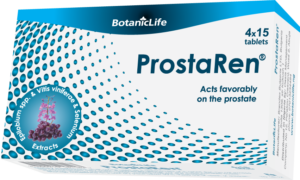⏰ Last Update: 14.08.2024
Prostate health is a critical aspect of men’s wellbeing, especially as they age. Among the various prostate-related conditions that men may experience, Benign Prostatic Hyperplasia (BPH), also known as prostate gland enlargement, is particularly common. BPH can cause discomforting urinary symptoms and, if left untreated, could lead to more severe complications. This article aims to provide a comprehensive understanding of BPH, its causes, risk factors, symptoms, potential complications, diagnostic procedures, and treatment options.
What is Benign Prostatic Hyperplasia?
Benign Prostatic Hyperplasia (BPH) is a non-cancerous enlargement of the prostate gland. The prostate is a small gland located between the bladder and the penis, responsible for producing seminal fluid. As men age, the prostate gland can gradually expand. If it becomes large enough, it may exert pressure on the urethra, leading to a range of urinary symptoms. BPH is a common condition, especially among men aged 50 years and above.
Benign Prostatic Hyperplasia (BPH) is considered to be an age-related condition, with the underlying causes still being the subject of extensive scientific research. One prevailing hypothesis links BPH to the natural changes in sex hormone balance and cellular responses that occur as men age.
Causes for BPH
As men grow older, the levels of active testosterone in their blood decrease, leaving a higher proportion of estrogen (female hormones). Studies have suggested that this increased ratio of estrogen to testosterone might instigate the proliferation of cells within the prostate, causing it to enlarge over time.
Additionally, another form of testosterone called dihydrotestosterone (DHT) may also play a significant role in the development of BPH. DHT is a potent androgen produced in the prostate gland, testicles, hair follicles, and adrenal glands. Even though the production of testosterone decreases with age, the level of DHT remains constant. DHT is believed to encourage the growth of prostate cells. Therefore, a constant level of DHT in the prostate, coupled with an increasing proportion of estrogen, may stimulate the prostate gland’s enlargement, leading to BPH.
Simultaneously, the role of testicles in BPH is noteworthy. Research indicates that men who have their testicles removed at a young age (for example, as a result of testicular cancer) do not develop BPH. On the other hand, if testicle removal occurs after a man has developed BPH, the prostate will begin to shrink in size.
These are some of the primary theories suggesting how BPH might develop. However, it’s important to emphasize that the exact biological mechanisms leading to BPH are complex and not fully understood. Therefore, more research is needed to elucidate the precise factors and mechanisms contributing to the development of BPH. It is likely that BPH results from multiple interacting factors, including genetic predispositions, hormonal changes, inflammation, lifestyle, and underlying medical conditions.
Risk Factors
Several factors may increase the risk of developing BPH:
Age
BPH is more common in older men, typically affecting those over 50.
Family History
Men with a family history of BPH are more likely to develop the condition.
Medical Conditions
Certain medical conditions such as obesity, type 2 diabetes, and heart disease might increase the risk of BPH.
Lifestyle Factors
Sedentary lifestyle and poor diet may also contribute to the risk.
Symptoms
BPH symptoms are usually related to urinary function and can range from mild to severe, depending on the extent of the prostate enlargement. Common symptoms may include:
- Increased frequency of urination, especially at night (nocturia)
- Difficulty starting urination (hesitancy)
- Weak urine stream or dribbling at the end of urination
- Incomplete bladder emptying
- Urgent need to urinate
Complications
If left untreated, BPH can lead to several complications:
Urinary Tract Infections (UTIs)
Reduced urinary flow can lead to urinary retention, increasing the risk of infections.
Learn everything you need to know about UTIs on the following link: https://botaniclife.ng/blog/urinary-tract-infection-uti/
Bladder Stones
These are hard masses of minerals that can cause infection, bladder irritation, or blockage of the urethra.
Kidney Damage
Chronic backflow of urine into the kidneys (reflux) can cause kidney damage over time.
Learn everything you need to know about the kidneys and their function on the following link: https://botaniclife.ng/blog/kidneys/
Diagnosing
The diagnosis of BPH usually involves a thorough medical evaluation, including:
Medical History
The doctor may ask about symptoms, medical history, and family history of prostate problems.
Physical Examination
A digital rectal examination allows the doctor to assess the size and condition of the prostate.
Urine Tests
Urine tests can help identify infections or other conditions causing the symptoms.
Blood Tests
Blood tests can help rule out kidney problems.
Prostate-Specific Antigen (PSA) Test
Elevated PSA levels can suggest BPH, prostate inflammation, or cancer.
Treatment for BPH
Treatment for BPH aims to alleviate symptoms and prevent complications. The appropriate approach depends on the severity of the symptoms and may range from watchful waiting for mild cases to medication or surgery for more severe ones.
A commonly used medication class is alpha-blockers, which work by relaxing the muscles in the prostate and bladder neck to allow easier urination. Another class, 5-alpha-reductase inhibitors, work by shrinking the prostate gland.
Natural supplements can also support prostate health. For example, ProstaRen is a specially formulated supplement that combines willow herb and grape seed extracts with organic selenium to support comprehensive prostate health. Its active ingredients have been carefully selected for their potential to support normal urinary function and contribute to the maintenance of a healthy prostate.
Learn everything you need to know about ProstaRen!
Healthy Lifestyle and Preventive Measures Against BPH
While you cannot control certain risk factors such as age and genetics, adopting a healthy lifestyle can help mitigate the risk of BPH and manage its symptoms if you already have the condition
Healthy Diet
A diet rich in fruits, vegetables, and lean proteins can help support overall health and may reduce the risk of BPH. Particularly, foods high in omega-3 fatty acids (like fish), and those rich in zinc (like nuts and beans) can promote prostate health. Avoid excessive consumption of red meat and processed foods, which may contribute to BPH and other health issues.
Physical Activity
Regular exercise is beneficial for overall health and may help prevent BPH. Physical activity helps maintain a healthy weight, reducing the risk of BPH. It can also aid in managing symptoms if you already have BPH.
Maintain a Healthy Weight
Obesity increases the risk of BPH, so maintaining a healthy weight may reduce the chances of developing this condition.
Regular Check-ups
Regular screening and check-ups are vital, especially for men over the age of 50, to detect any signs of prostate enlargement in the early stages. Early detection can lead to more effective treatment.
Limit Liquid Intake at Night
To manage the symptom of frequent urination at night, try limiting the amount of liquid you drink in the evening, particularly before bedtime.
Minimize Bladder Irritants
Caffeine, alcohol, and spicy foods can irritate the bladder, exacerbating symptoms of BPH. Reducing these can help manage symptoms.
Use of Supplements
Dietary supplements like ProstaRen, which contains extracts from willow herb and grape seeds as well as organic selenium, can be used to support comprehensive prostate health. However, you should always consult your healthcare provider before starting any new supplement regimen.
Learn everything you need to know about ProstaRen on the following link: https://botaniclife.ng/product/prostaren/
Conclusion
Understanding Benign Prostatic Hyperplasia is critical for men’s health, especially as they age. Being aware of the risk factors and symptoms can lead to early diagnosis and effective treatment, reducing the risk of complications. Maintaining a healthy lifestyle, along with regular medical check-ups, can go a long way in preserving overall health and wellness. For individuals diagnosed with BPH, treatment options are plentiful and improving, with a variety of medications and natural supplements like ProstaRen available to manage symptoms and improve quality of life.





